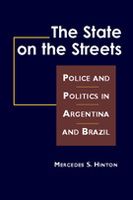Mercedes S. Hinton
Winner of the British Society of Criminology's Best Book Award!
How Latin American governments will respond to popular outcry against unprecedented levels of both corruption and crime ranks among the principal political questions of this decade. The State on the Streets focuses on the tense interplay of police, democracy, state, and civil society in the region, using the cases of Argentina and Brazil as a lens.
Mercedes Hinton draws on her rare access to a wide spectrum of actors in the two countries—including top police officials and street patrolmen, military officers and legislators, clergy and prostitutes, business owners and shantytown residents—to present a vivid account of politics on the ground. Her in-depth comparative analysis reveals surprising parallels in the reform patterns adopted in Argentina and Brazil in the past decade, supporting conclusions that carry disturbing implications for the prospects for democratic consolidation in Latin America as a whole.
Mercedes S. Hinton is Nuffield Research Fellow at the London School of Economics and Political Science, where she works on issues of development and democracy.
"A must read for those studying the nuances of policing and political change in Latin America."—Jennifer Wood, Bulletin of Latin American Research
"Based on extensive field research and in-depth interviews with many stakeholders, Hinton’s comparative study is more than welcome in this field where such methodology is still not widespread."—Marieke Denissen, European Review of Latin American and Caribbean Studies
"No one writing about the reform of police in Latin America or about the politics of police reform generally should begin their analysis without reading and referencing this book. Hinton's The State on the Streets will be a standard bearer in police research for years to come."—Martha K. Huggins and Saima Husain, International Studies Review
"A very significant contribution to our understanding of the opportunities and challenges for effective and democratic police reform in countries that are in transition or which have recently emerged from military dictatorships.... Both a refreshing and thought-provoking comparative addition to the English-language insight into policing in Latin-America, and a welcome comparative addition to the English-language scholarly literature on policing more generally."—Philip Stenning, British Journal of Criminology
"Hinton's book is a valuable comparison of police reform in two important cities.... The result is an impressive grasp of the realities of police work.... At the same time that Hinton gets the details right, she also grounds her book effectively in the mainstream work on the quality of democracy in Latin America."—John Bailey, ReVista: Harvard Review of Latin America
"This book is a breath of fresh air in the study of the politics of policing in the Americas."—Paul Chevigny, New York University
"An up-to-date, vivid, and illuminating comparative analysis of the obstacles to police reform in South America. Dr. Hinton has focused on one of the most critical (and little studied) obstacles to full democratization in the region."—Laurence Whitehead, Nuffield College, University of Oxford








